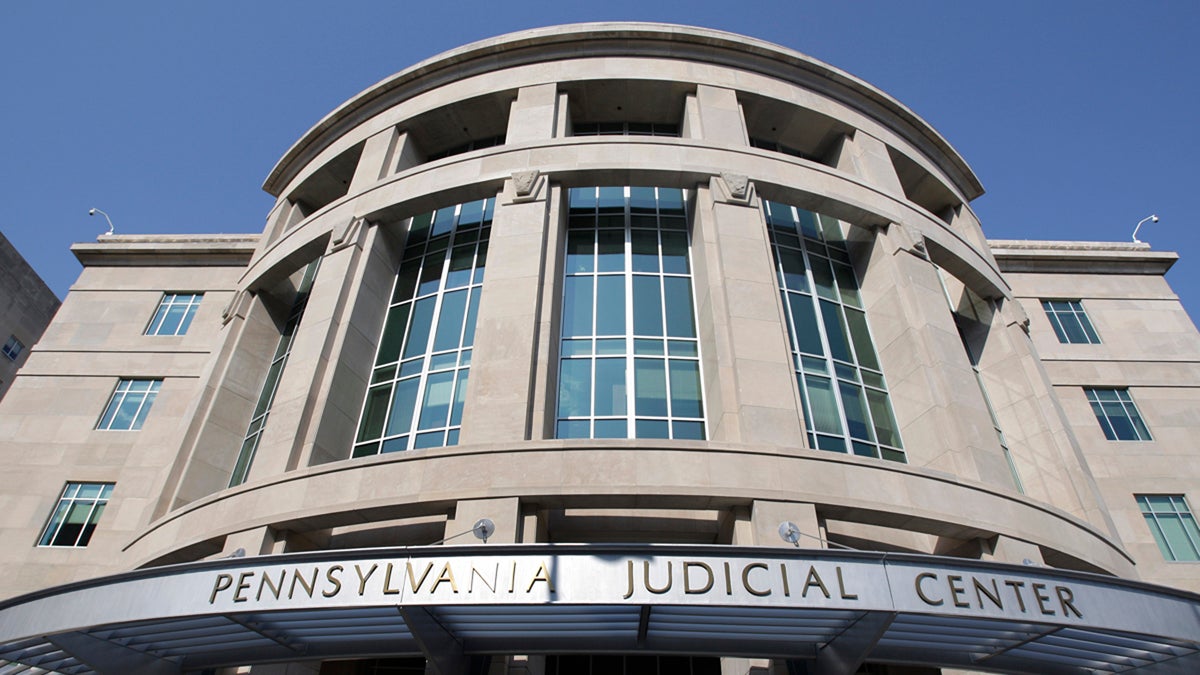Decision near on use of ‘hearsay’ evidence at Pa. preliminary hearings

In this photo taken Monday
Moving someone charged with a crime in Pennsylvania beyond the preliminary hearing stage based on second- or third-hand testimony is a “radical evisceration” of a defendant’s rights, making it impossible for attorneys to effectively defend the accused.
That’s the opinion of the Pennsylvania Association of Criminal Defense Lawyers, representing some 850 attorneys, which is among the groups that have written to the Pennsylvania Supreme Court ahead of a soon-to-be released decision over how criminal cases move to trial.
Under current rules, prosecutors can establish that a defendant has committed a crime in a preliminary hearing using “hearsay” evidence, such as a police statement or recorded comments from investigators. But a case out of the Harrisburg area is challenging that rule by insisting that the accused should be able to confront an accuser not just at trial, but also at the preliminary hearing.
It’s an argument that attorneys representing Bill Cosby are now making in the entertainer’s latest appeal to unravel the first criminal sexual charges he has ever faced. A hearing on whether it was improper to advance Cosby’s case toward trial on hearsay evidence is scheduled for Thursday in Montgomery County.
Given that the court would not only have to reverse its rule, but also apply it retroactively, a decision that directly affects the Cosby’s case, legal experts say, is not likely.
Still, the new back-and-forth among prosecutors and defense advocates represents a preview of what’s expected at Cosby’s Thursday hearing as his attorneys attempt to hold up their client as the victim of a state criminal justice system that has trampled on his due process rights.
Other groups — including the Pennsylvania Coalition Against Domestic Violence — have written to the high court as it reviews the hearsay question, asking the justices to leave the rules alone.
“When victims testify repeatedly about the abusive incident, beginning with a preliminary hearing, they are often retraumatized by reliving the abuse through their testimony,” coalition attorney Rachel Haynes wrote to the court.
Victims can be financially dependent on perpetrators and fear the loss of financial support and housing if the abuser is jailed, Haynes said. And victims may be subject to physical retaliation or intimidation by perpetrators, she said.
“The ability to rely exclusively on hearsay at the preliminary stage of the prosecution serves victims and the justice system and does little to impinge on the constitutional rights of criminal defendants,” Haynes said.
‘Credibility not a factor at preliminary hearing’
Pennsylvania allows hearsay during a preliminary hearing but bans it at the actual trial so that fact-finders, such as a jury, can assess the credibility of a witness when someone is on trial. But those confrontational rights shouldn’t be extended before the trial because it’s just not relevant, wrote Francis Chardo, Dauphin County first assistant district attorney.
“Credibility is not a factor at a preliminary hearing,” Chardo wrote.
When a state Supreme Court panel wrote the rules about hearsay evidence, it intended to clarify what was allowed — and what wasn’t — to exclude competing interpretations. It was a bright-line message that using hearsay evidence at this stage is on firm footing. Shaking that up, Chardo said, would create substantial gray areas for the 526 magisterial district judges around the commonwealth hearing criminal cases.
“Absent the blanket mandate for consideration of hearsay at preliminary hearings, there would be potentially 526 different interpretations of the degree to which hearsay would be admitted,” he wrote.
But defender Peter Rosalsky, writing on behalf of public defenders in Philadelphia, said choosing to keep the current rules would relegate fairness to the wayside.
“The purpose of the preliminary hearing, to prevent unwarranted incarceration and to avoid improper charges from proceeding to trial, are completely undermined,” he wrote, if a cases moves forward “solely by unreliable evidence.”
Prosecutors, under the current rules, can game the system, Rosalasky argued.
For instance, if the commonwealth suspects that the hearsay evidence presents a stronger case than the victim would, prosecutors will always put the second- or third-hand witnesses on the stand during the preliminary hearing.
“It can (and often will) make this choice purely for strategic advantage,” Rosalsky wrote.
Beginning cross-examinations before trial is also important in terms of having fresher, more accurate testimony, instead of waiting many more months, or years, after an incident occurred to testify, he said.
Letting defense attorneys question witnesses early will let the judge make the best determination, instead of, as Rosalsky put it, relying on the “selectively produced handiwork of the police.”
A decision is expected sometime after oral arguments take place, which will be set after the next brief deadline of July 29.
WHYY is your source for fact-based, in-depth journalism and information. As a nonprofit organization, we rely on financial support from readers like you. Please give today.

